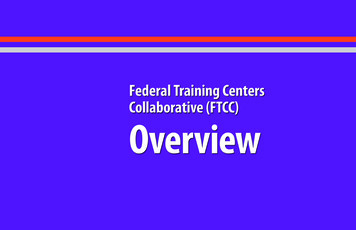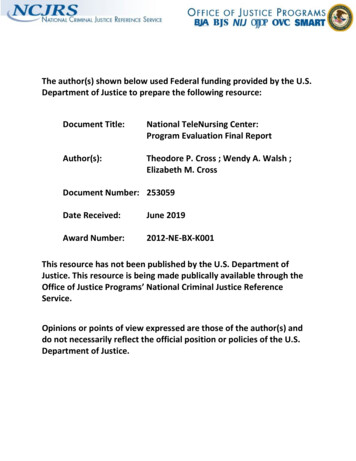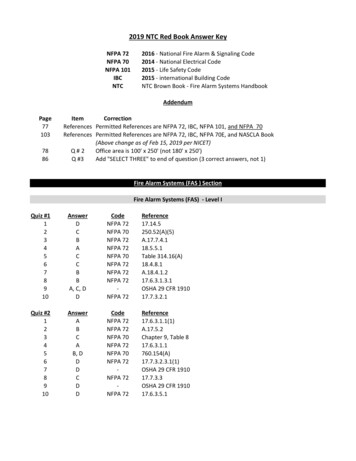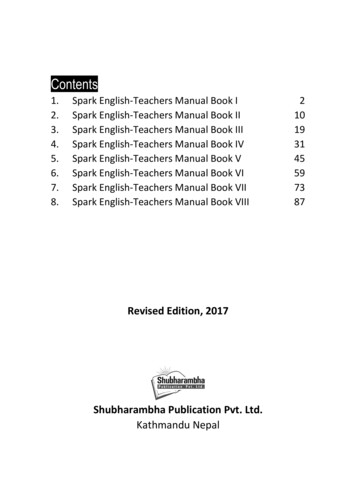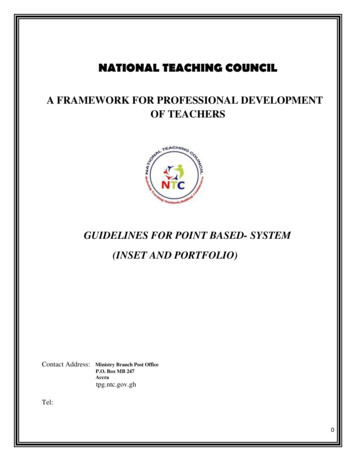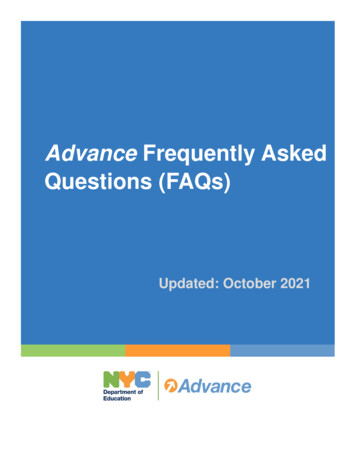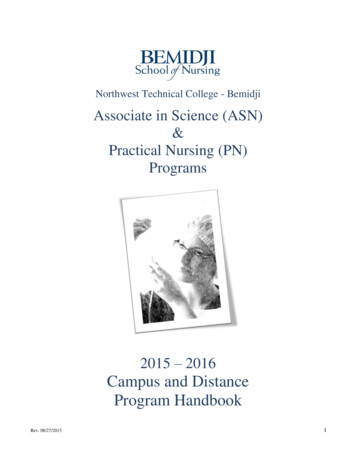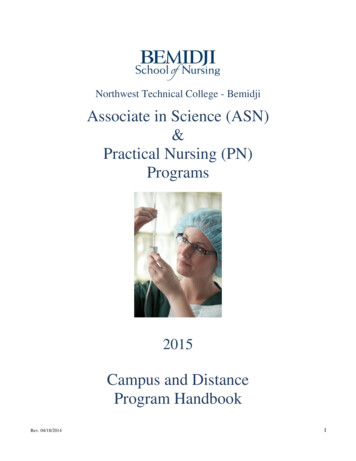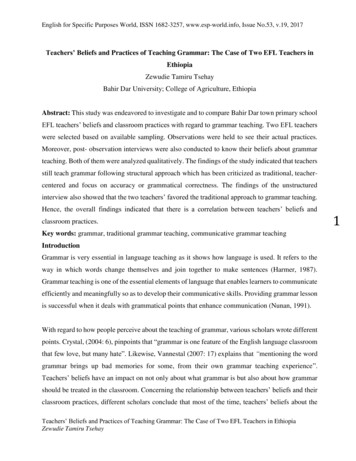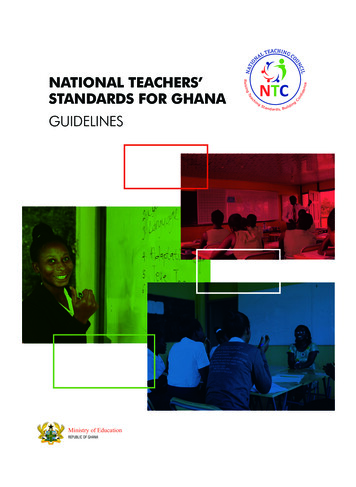
Transcription
EACHINGLTCONACILUNREPUBLIC OF GHANAonfi denceNTCngChicMinistry of EducationeagTGUIDELINESR aisinNATIONAL TEACHERS’STANDARDS FOR GHANANATIONATIONAL TEACHING COUNCILStan d a rd s, B u ildi ng
The National Teachers’ Standards for Ghana Guidelines document provides thestandards for both pre-service and in-service teachers. The pre-service Standardsapproved by the Cabinet of the Republic of Ghana on 28th September 2017,informed the development of the standards for in-service teachers.
1NATIONAL TEACHERS’ STANDARDS FOR GHANA: GUIDELINES
For the development of in-service StandardsThe National Teaching Council (NTC) would like to express its appreciation to thosewho contributed towards the writing of this guidelines. The NTC would also like tothank the Japan International Cooperation Agency (JICA), and PTPDM Project forsupporting this effort.NATIONAL TEACHERS’ STANDARDS FOR GHANA: GUIDELINESThe following is the list of persons who contributed to this document.2Prof. Eric Nyarko-SampsonCouncil Chair, NTC (2017)Dr. Evelyn OduroAg. Executive Secretary, NTC (2016)Prof. Kwame AkyeampongUniversity of SussexMr. Gideon AhoholuCoordinator, National INSET Unit, NTCMs. Grace Agyeman DuahNTCLawrence SarpongAg. Director Professional Operations, NTCEmmanuel Aboagye TawiahDeputy Executive Secretary, NTC (2016)Prof. Paul BuatsiSenior Consultant, JICA PTPDM ProjectProf. Jonathan FletcherUniversity of GhanaProf. George KankamUniversity of Education
FOREWORDThe National Teachers’ Standards represents the first ever collectively agreedstandards to guide teacher preparation and practice in the country. The Standardshave been developed as a professional tool to guide teacher educators, teachers,student teachers and other stakeholders in education to identify in clear andprecise terms what teachers are expected to know and be able to do, qualitiesthey are expected to possess and some behaviour they are supposed to exhibit.The Standards set a clear baseline of expectations for the professional knowledge,practice, conduct, attitude, rights and obligations expected of teachers working inschools at the pre-tertiary level. All teachers completing their initial teacher trainingwill be assessed against the National Teachers’ Standards.These Standards are designed to improve the quality of teachers’ delivery andstudents’ performance and should therefore be used as a reference tool for studentteachers, teacher educators, in-service teachers, head teachers, mentors, schoolinspectors and all who are working at training student teachers. The Standards willalso enable teacher educators and others to direct their efforts appropriately to theareas student teachers need most support.The development of these standards is consistent with discussions on both pretertiary curriculum and teacher education reforms occurring nationally and led bythe Ministry of Education, about the most successful processes for assuring teacherquality and students’ learning outcomes.I recognise that intensive professional development workshops will be requiredto prepare teacher educators to effectively prepare student teachers to deliver onthe standards, but it is my strong belief that with dedication and commitment thequality of teaching and student learning outcomes will improve markedly.In this regard, I wish to call on all stakeholders in pre-tertiary education to embracethe National Teachers’ Standards and employ it effectively as a tool to bring aboutimproved learning outcomes in our education system. To God be the Glory.Hon.Dr. Matthew Opoku PrempehMinister for EducationNATIONAL TEACHERS’ STANDARDS FOR GHANA: GUIDELINESIt is noteworthy that the National Teachers’ Standards replaces the diversity ofstandards being used in the various institutions offering initial teacher educationand/or providing continuing professional development with a consolidated set ofnational standards to ensure that student teachers’ training and development isguided by the same set of standards.3
CONTENTSWHAT ARE THE STANDARDS FOR?6WHO ARE THE STANDARDS FOR?8HOW WERE THE STANDARDS DEVELOPED?8WHAT IS THE LEGAL STATUS OF THE TEACHERS’ STANDARDS?10WHAT PHILOSOPHY UNDERPINS THE STANDARDS?10HOW ARE THE TEACHERS’ STANDARDS ORGANISED?12THE TEACHERS’ STANDARDS131. Professional Values and Attitudes2. Professional Knowledge3. Professional Practice131415HOW ARE THE STANDARDS TO BE USED?16WHAT ARE THE ROLES OF TEACHER EDUCATION INSTITUTIONS?17SECTION 1: FORMAT OF THE STANDARDS18National Teachers’ Standards for Ghana: Exemplars for useNATIONAL TEACHERS’ STANDARDS FOR GHANA: GUIDELINESby Student Teachers, Teachers, Tutors, Head Teachers and Mentors4SECTION 2: FORMAT OF THE STANDARDS33WHAT IS THE RATIONALE FOR THE STANDARDS?34EVIDENCE CRITERIA34BIBLIOGRAPHY44APPENDIX47GLOSSARY51
BECEBasic Education Certificate ExaminationCPDContinuous Professional DevelopmentCRDDCurriculum Research Development DivisionGESGhana Education ServiceICTInformation and Communication TechnologiesJHSJunior High SchoolKGKindergartenMoEMinistry of EducationNABNational Accreditation BoardNaCCANational Council for Curriculum and AssessmentNEANational Education AssessmentNIBNational Inspectorate BoardNTCNational Teaching CouncilNCTENational Council for Tertiary EducationPRINCOFNational Conference of Principals of Colleges of EducationPTAParent Teacher AssociationSHSSenior High SchoolSMCSchool Management CommitteeTEDTeacher Education DivisionUCCUniversity of Cape CoastUEWUniversity of Education, WinnebaWASSCEAfrican Senior School Certificate ExaminationNATIONAL TEACHERS’ STANDARDS FOR GHANA: GUIDELINESACRONYMS5
WHAT ARE THE STANDARDS FOR?For Pre-service and In-service TeachersTeachers play such a critical role in inspiring and challenging students to achievetheir potential that their preparation and subsequent development require thehighest possible standards in knowledge, conduct and practice in their workplace.These Standards are concise written statements of what teachers are expected toknow and be able to do.NATIONAL TEACHERS’ STANDARDS FOR GHANA: GUIDELINES T he National Teachers’ Standards set out the minimum levels of practice that alltrained teachers must reach by the end of their pre-service teacher educationcourse in order to play such a critical role.6 T hese Standards also inform teachers’ development while in their first year asBeginning Teachers on their induction course in schools prior to licensing asprofessional teachers by the National Teaching Council (NTC) and provide theframework for future professional and career development for all teachers. T he Standards should be seen as one common core set of standards that applyto all teachers at all levels. The exemplar that accompany the Standards at theend of these guidelines give specific exemplars of the Standards in action atthe kindergarten, primary, junior high school and senior high school levels togive further support for those using them. The indicators provide evidence ofattainment of the Standards.
For In-Service TeachersSpecific to in-service teachers, the Pre-tertiary Teachers’ Standards for Ghana(PTTSG) are concise statements of what teachers are expected to know, understandand be able to do as teachers to ensure they continually improve their own learningas well as those they teach.(1) T he Standards aim at ensuring that as teachers move up from one rank to theother in their career; they are empowered to engender effective learning amongthose they are expected to teach.(2) A t each stage of their journey to become accomplished teachers, the Standardsexpect teacher to: have a sound knowledge of learners’ different ways of organising their learning; d emonstrate knowledge and understanding of how different learning stylesimpact on teaching; reflect thoroughly on the effectiveness of teaching approaches; d emonstrate good knowledge and understanding of how to use assessment tosupport learning; and i dentify their own training needs and take responsibility for addressing themthrough lifelong learning.NATIONAL TEACHERS’ STANDARDS FOR GHANA: GUIDELINES demonstrate good knowledge in the relevant subject(s) and curriculum areas;7
WHO ARE THE STANDARDS FOR?The Standards apply to: S tudent Teachers on pre-service teacher training courses working towardsmeeting the Standards by the end of their course. All beginning teachers in their Induction Year in schools. A ll in-service teachers in schools, who are covered by the 2016 new NTCframeworks for career progression and promotion. The Standards serve as apoint of reference for all standards and competencies.NATIONAL TEACHERS’ STANDARDS FOR GHANA: GUIDELINES T he National Teaching Council (NTC) will use the Teachers’ Standards in assessingcases of any misconduct by any member of the teaching profession.8 The National Teaching Council (NTC) for the licensing of teachers after induction T he NTC will use the Teachers’ Standards as a benchmark for the renewal ofteachers’ license A ll those institutions involved in the training and development of teachers,including universities and colleges both public and private, vocational/technicaland academic. T eacher educators will use it as a guide in the preparation of curricula andcourses for teacher training. D istrict education directors, circuit supervisors, teacher unions, head teachersand mentors in schools will also need to use the Teachers’ Standards as a guideto inform their work – serve as a common point of reference.
HOW WERE THE STANDARDS DEVELOPED?The development of the Standards arose from the need to consolidate the differentstandards being used in institutions offering initial teacher training and those whoprovide continuing professional development into a national standard to ensure thatthe development of student teachers is guided by the same set of standards. TheStandards were developed from a number of sources, including: A ssessment tools used by the University of Cape Coast (UCC) and University ofEducation, Winneba (UEW) for assessing student teachers during on-campusteaching and practicum Handbook for Principal Teacher Aspirants by the Ghana Education Service Manual for Student teachers on School Attachment Handbook on Mentorship and the Student Teacher Competence Matrix I nvolvement of practitioners across all sectors and other key stakeholdersincluding the National Teaching Council (NTC), National Council for TertiaryEducation (NCTE), National Accreditation Board (NAB), Ghana Education Service(GES), National Council for Curriculum and Assessment (NaCCA), NationalInspectorate Board (NIB), Principals of Colleges of Education, Teacher Unions andTeacher Education Universities (UCC and UEW).An ad hoc vetting committee on Teachers’ Standards made up of members fromthe above regulatory bodies reviewed the draft standards prior to full validationon December 7, 2015. The stakeholders worked to ensure that the standards areembedded in the Ghanaian context, are realistic and achievable by the majority ofGhanaian teachers, if not all.For In-Service TeachersSpecific to the in-service teachers, a pilot study was also conducted in five districts(Shai Osudoku, Ajumako Enyan Essiam, Upper Manya Krobo, Savelugu Nanton, andKasena Nankana Municipal) to obtain evidence-based data as to how the careerprogression standards would help in promoting CPD of teachers.NATIONAL TEACHERS’ STANDARDS FOR GHANA: GUIDELINES Survey of national teaching standards in more than eight countries9
HAT IS THE LEGAL STATUS OF THEWTEACHERS’ STANDARDS?The 2008 Education Act (Act 778) established the National Teaching Council and it isresponsible for establishing frameworks around teachers’ employment, continuousprofessional development (CPD) and periodic review of professional practiceand ethical standards. The NTC has overall responsibility to license teachers by law.These Standards define the minimum levels of practice expected of student teachersand teachers in order to be licensed. It must be noted that during the training andthe period of induction, the Standards continue to define the level of practice atwhich all qualified teachers are expected to perform.NATIONAL TEACHERS’ STANDARDS FOR GHANA: GUIDELINESUniversities and Colleges of Education must ensure that the design and contentof their pre-service programmes and their delivery allow student teachers to besuccessfully assessed against the Standards by the end of their period of training.This will particularly be relevant for the school practicum components that mustprovide extended and guided periods of teaching in classrooms.10Opportunities must be given to those already teaching in schools to apply theirpractice to the Teachers’ Standards over a given period of time.Student teachers must be realistically and fairly assessed against the Standardsin accordance with what can be reasonably expected of teachers still learning toteach. Student teachers’ creative and innovative skills will need to be assessed asappropriate to the specific context and circumstances they are in and for the level oflearners they are to teach, for example, for very young children in pre-school, or foryoung people needing specialist knowledge at senior high school.For In-service TeachersSpecifically, to in-service teachers - those on induction as well as other un-licensedteachers must be realistically and fairly assessed against the Standards in accordancewith what is expected of them. Teachers’ creative and innovative skills should alsobe assessed as appropriate to the specific context and circumstances they are in andfor the level of learners they teach.
HAT PHILOSOPHY UNDERPINS THEWSTANDARDS?Over the years Ghana has reformed and restructured its teacher educationsystem in response to demands of new vision and mission for education to meetthe demands of a knowledge society in which the teacher is an agent of change.What has been missing in this entire process is a set of professional standards forteachers that provide a strong definition of and a key reference point for the workof teachers towards achieving the learning and social outcomes articulated in the2008 Education Act. The Standards are, therefore, designed to codify what a ‘goodteacher’ looks like for Ghana, recognising the urgent need to improve the quality ofthe school experience and learning outcomes for all learners and to raise the statusof teachers in their communities and country. The Standards are aspirational in theirvision, positively embracing the promises and challenges of the 21st century forGhana. More importantly, they support Ghana in meeting Goal 4 of the SustainableDevelopment Goals for 2030 to ‘ensure inclusive and equitable quality educationand promote life-long learning opportunities for all’. In contributing towards thisgoal, the Standards are also realistic and relatively few in number so as to beachievable and user-friendly.The development of the Standards was also informed by a review of internationalteaching standards whereby what is deemed most important is that teachersapply their content knowledge in the classroom, thereby demonstrating soundpedagogical content knowledge. Correspondingly, the practicum within teachereducation programmes can take up to 25 per cent of the course.Taking both the existing Ghanaian standards, aims for teacher education, context,and the international standards into account, these new Standards for Ghanaemphasise the applied practical work of a teacher as a valued professional in acommunity of practice and envisage a warm and friendly teacher who has securecurricular, subject and pedagogical content knowledge, who plans for and usesdifferent interactive instructional strategies and resources and so engages theirlearners, who achieves higher learning outcomes for all, particularly learners whoare more vulnerable, those with disabilities, girls and those who need cognitivechallenge, and who uses assessment productively in achieving those outcomes.NATIONAL TEACHERS’ STANDARDS FOR GHANA: GUIDELINESTeacher education in Ghana aims to prepare teachers imbued with professionalskills, attitudes and values as well as the spirit of inquiry, innovation and creativitythat will enable them to adapt to changing conditions, use inclusive strategies andengage in lifelong learning. The teachers are required to have a passion for teachingand leadership, engage with members not only in the school community but also inthe wider community and act as agents of change.11
OW ARE THE TEACHERS’ STANDARDSHORGANISED?The Standards are divided into three main domains, each with its own sub-divisions:Professional Values and AttitudesProfessional DevelopmentCommunity of PracticeProfessional KnowledgeKnowledge of Educational Frameworks and CurriculumKnowledge of LearnersProfessional PracticeNATIONAL TEACHERS’ STANDARDS FOR GHANA: GUIDELINESManaging the Learning EnvironmentTeaching and LearningAssessment12These three domains and aspects encompass what teachers should value, knowand do, and intersect with one another to develop a teacher competent enough toteach at the end of their four-year initial teacher training, as illustrated in the Venndiagram where the synthesis of the three domains represents this competence.1ProfessionalValues ctice
THE TEACHERS’ STANDARDS1Professional Values and AttitudesProfessional DevelopmentThe Teacher(s):a) Critically and collectively reflects to improve teaching and learning.b) Improves personal and professional development through lifelong learning andContinuous Professional Development.c) Demonstrates effective growing leadership qualities in the classroom and widerschool.The Teacher:d) Is guided by legal and ethical teacher codes of conduct in his or her developmentas a professional teacher.e) E ngages positively with colleagues, learners, parents, School ManagementCommittees, Parent-Teacher Associations and wider public as part of a communityof practice.f) Develops a positive teacher identity and acts as a good role model for studentsg) Sees his or her role as a potential agent of change in the school, community andcountry.NATIONAL TEACHERS’ STANDARDS FOR GHANA: GUIDELINESCommunity of Practice13
2Professional KnowledgeKnowledge of educational frameworks and curriculumThe Teacher:a) Demonstrates familiarity with the education system and key policies guiding it.b) Has comprehensive knowledge of the official school curriculum, includinglearning outcomes.c) H as secure content knowledge, pedagogical knowledge and pedagogical contentknowledge for the school and grade they teach in.d) At pre-primary and primary the teacher knows the curriculum for the yearsappropriate to multigrade classes; has good knowledge of how to teach beginningreading and numeracy and speaking, listening, reading and writing, and to use atleast one Ghanaian language as a medium of instruction.NATIONAL TEACHERS’ STANDARDS FOR GHANA: GUIDELINESKnowledge of students14The Teacher:e) U nderstands how children develop and learn in diverse contexts and applies thisin his or her teaching.f) Takes accounts of and respects learners’ cultural, linguistic, socio-economic andeducational backgrounds in planning and teaching.
3Professional PracticeManaging the learning environmentThe Teacher:a) Plans and delivers varied and challenging lessons, showing a clear grasp of theintended outcomes of their teaching.b) Carries out small-scale action research to improve practice.c) Creates a safe, encouraging learning environment.d) Manages behaviour and learning with small and large classes.The Teacher:e) E mploys a variety of instructional strategies that encourages student participationand critical thinking.f) Pays attention to all learners, especially girls and students with Special EducationalNeeds, ensuring their progress.g) Employs instructional strategies appropriate for mixed ability, multilingual andmulti-age classes.h) Sets meaningful tasks that encourages learner collaboration and leads topurposeful learning.i) Explains concepts clearly using examples familiar to students.j) Produces and uses a variety of teaching and learning resources including ICT, toenhance learning.AssessmentThe Teacher:k) Integrates a variety of assessment modes into teaching to support learning.l) Listens to learners and gives constructive feedback.m) Identifies and remediates learners’ difficulties or misconceptions, referringlearners whose needs lie outside the competency of the teacher.n) Keeps meaningful records of every learner and communicates progress clearly toparents and learners.o) Demonstrates awareness of national and school learning outcomes of learners.p) Uses objective criterion referencing to assess learners.NATIONAL TEACHERS’ STANDARDS FOR GHANA: GUIDELINESTeaching and Learning15
HOW ARE THE STANDARDS TO BE USED?Standards are clear expectations of skills that teachers should be able todemonstrate. They may be used in training institutions, schools, inspectorate bodies,continuous professional development at an individual, school or cluster-based level,training, induction, and self-development. College principals, tutors, headteachersand mentors in schools, as well as student teachers and teachers themselves,will use the Standards as the key reference point in their assessment – licensingand renewing teachers’ license in Ghana and as a reference point for consideringteachers’ application for promotion.NATIONAL TEACHERS’ STANDARDS FOR GHANA: GUIDELINESEvidence that a student teacher or teacher can meet all of the Standards must be inthe form of a professional portfolio organised according to the three16domains. Evidence from college-based learning will be in the form of assignments,examination results and lecture notes. Evidence from in-school learning will bein the form of lesson plans, study notes, resources, assessment records, learnerexercise books, photographs, lesson evaluations from tutors and mentors,testimonials, minutes of meetings and any notes from CPD courses, evidencecollected by the student teacher or teacher over time. As a critically reflectivepractitioner, the professional portfolio provides the starting point for the continueddevelopment of the teacher in their induction year and for subsequent years.For In-service TeachersSpecific to in-service teachers, the Standards can also be used by the relevantauthorities in education to support career progression in the teaching professionby ensuring that teachers and leaders occupying various positions in the professionhave met all the criteria imposed by the Standards. In their career progression,teachers and leaders should be required to meet their training needs for a specificrole before they assume that role. That way, teacher career progression would beseamless, and this will provide the motivation teachers and leaders need in order toensure that learning outcomes are maximised.
HAT ARE THE ROLES OF TEACHERWEDUCATION INSTITUTIONS?It will be important for teacher education institutions (lecturers and tutors) tocome to a shared understanding of what each Standard means as a community ofeducation professionals, but also in partnership with headteachers, mentors andexperienced teachers in local schools.Heads of teacher education institutions must ensure that the design and delivery oftheir pre-service curriculum support student teachers in developing and reachingthe Standards. Links with early-learning centres and schools on the university/college campus and in surrounding areas (or in partnership schools) may needLecturers/Tutors may need recent and relevant school experience, particularly ifthey have not been teachers themselves at the level at which they are trainingstudent teachers to work in. Lecturers/Tutors will also need professionaldevelopment to understand the Standards and to redesign their teaching to supportthis, in both content and the pedagogy they use. They will need to support studentteachers to reflect back on their various school experiences and to make sense ofwhat they have learnt. Universities/Colleges with schools on campus provide idealopportunities for lecturers/tutors to observe classes with their student teachers, tomodel exemplary teaching themselves and to work alongside teachers in guidingand assessing student teachers. Tutors will also need training and opportunities towork more closely with mentors and supervisors in schools.Schools/Headteachers will need to work in partnership with universities/colleges inaccommodating student teachers so that they can fully experience what it means tobe a teacher, particularly for Professional Values and Attitudes.Mentors and supervisors will need to work with their student teachers carryingout joint planning sessions with them and allowing student teachers to workwith a particular child or group of children, accompany their mentor to staff andparent-teacher meetings, team-teach and then in the final practicum take onthe responsibility of several classes. Mentors will also have to undertake regularmeetings with their student teachers to discuss progress against meeting theStandards, taking action where there are gaps in what the student teachers knowcan do or have not yet had an opportunity to experience.NATIONAL TEACHERS’ STANDARDS FOR GHANA: GUIDELINESto be further developed to give student teachers sufficient school and teachingexperience to meet the new Standards.17
NATIONAL TEACHERS’ STANDARDS FOR GHANA: GUIDELINESSECTION 1:FORMAT OF THE STANDARDS18
FORMAT OF THE STANDARDSThe format for the presentation of the pre-service standards and the exemplarsare presented in table 1 below. Using a three (3) column format, the standardsare presented to encourage the user to think about examples of each particularstandard and the means of verification (indicator) of that standard.National Teachers’ Standards for Ghana: Exemplars for use by Student Teachers,Teachers, Tutors, Head Teachers and MentorsStandardExamples of the Standards in actionExamples of someindicators of teacher’sperformanceThese apply to all teachers acrosskindergarten, primary, junior highschool and senior high schoolSpecific examples that are moreappropriate forJunior and Senior High School are putinto italics1. Professional Values and Attitudesa. Critically andcollectively reflectsto improve teachingand learning.Critiques own practice (keeping inmind gender responsive practice) andshows agency in improving learning,sometimes with a peer, mentor, orwith a group of student teachers atcollege or colleagues at school.Lesson notes andevaluations, Reflectivelogs, journals or portfolioswritten while in training oron practicum (GenderResponsive Scorecardcan be used to do aself-assessment andprompt reflection ongender responsivepractice).b. Improves theirpersonal andprofessionaldevelopmentthrough lifelonglearning andcontinuousprofessionaldevelopment.Identifies gaps in knowledge, goesbeyond the textbook, carries outself-directed study through accessinglibraries, the internet, experiencedcolleagues; applies new learning fromCPD in their practice.Study notes, lessonnotes, portfoliosCertificate ofattendance on CPDcourses Improved learningoutcomes of learners,Gender ResponsiveScorecard for Teachers,National GenderHandbook.NATIONAL TEACHERS’ STANDARDS FOR GHANA: GUIDELINESProfessional development:19
National Teachers’ Standards for Ghana: Exemplars for use by Student Teachers,Teachers, Tutors, Head Teachers and MentorsStandardc. Demonstrateseffective growingleadership qualitiesin the classroom andwider school.Examples of the Standards in actionExamples of someindicators of teacher’sperformanceTutors’ report, journalDelegates roles to females andof activities, mentor ormales equally, such as classroom,headteacher reportsbook or board monitor in theirclassroom; volunteers to work onstudent leadership, running thelibrary; speaks up in school meetings;supports peers and colleagues inschool. Does not delegate roles basedon gender roles and stereotypes.Community of Practice:NATIONAL TEACHERS’ STANDARDS FOR GHANA: GUIDELINESd. Is guided by legaland ethical teachercodes of conduct intheir developmentas a professionalteacher.20e. Engages positivelywith colleagues,students, parents,SMC, PTA and widerpublic as part of acommunity ofpractice.Shows high levels of attendance andpunctuality Has a high regard forpolicies of MoE/GES and those of theschool in which they teach; actswithin policies that definestheir professional duties andresponsibilities; has high respect forfemale and males’ dignity, wellbeing and rights; avoids exploitingthe vulnerability of learners(especially with regard to females).Demonstrates knowledge of MoE/GES ethical codes, (Genderand Sexual Harassment policy) andlives according to their remit.Teacher attendancerecordsAttends and contributes toschool meetings, parent-teacherconsultations, SMC and PTAmeetings as appropriate (keeping inmind the need to sensitise about theimportance of educating girls); knowsabout the local area where they arepracticing, is aware of their learners’backgrounds, and are seen to engagein school and local events, festivals,faith activities. Encourages parentsto support their children in theireducation.Headteacher recordsMinutes of meetingsHeadteacher or mentorreference letterHeadteachers’ andmentors’ reportsTeacher’s study andlesson notes Has copies ofGES/ MoES policies onTeacher Ethics, Gender,and Sexual harassmentTeacher’s notes andjournals
National Teachers’ Standards for Ghana: Exemplars for use by Student Teachers,Teachers, Tutors, Head Teachers and MentorsStandardExamples of the Standards in actionf. Develops a positiveteacher identity andacts as a good rolemodel for learners.Expresses their own philosophy ofwhat it means to be a teacher; showspride in their profession; learners likeand respect their teacher; learnerssee their teacher as a role model forfemales
The NTC would also like to thank the Japan International Cooperation Agency (JICA), and PTPDM Project for supporting this effort. The following is the list of persons who contributed to this document. Prof. Eric Nyarko-Sampson Council Chair, NTC (2017) Dr. Evelyn Oduro Ag. Executive Secretary, NTC (2016)
